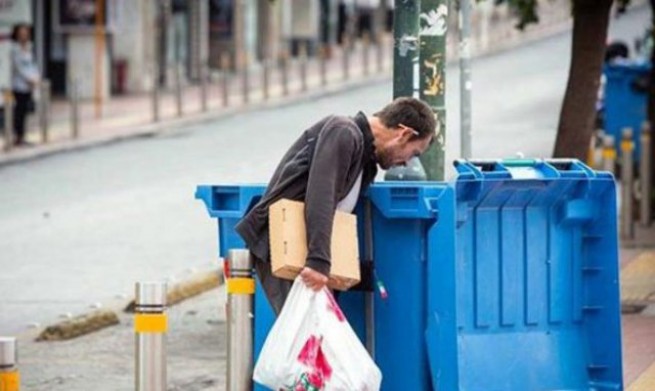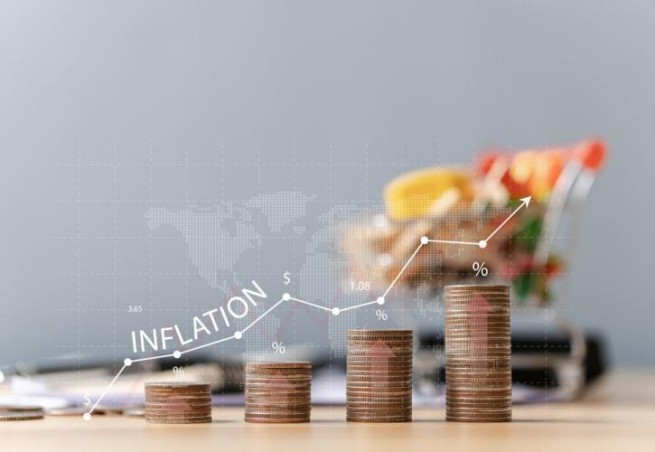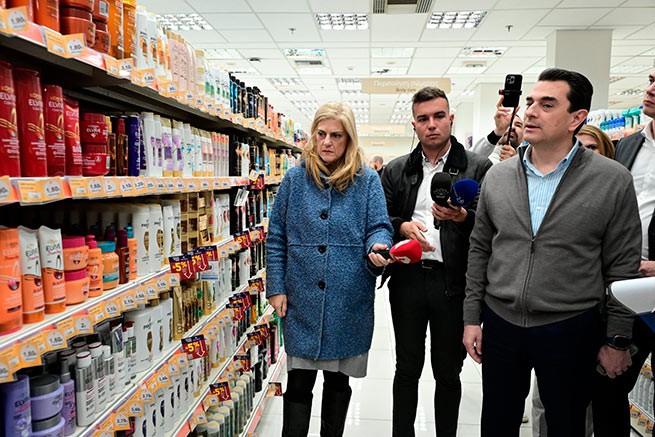At a time when food prices continue to rise, driving consumers into despair, the government is loudly announcing price cuts on 3,900 items of everyday goods, proposing 4 new measures with which it hopes to (once again) combat high costs and eliminate growing dissatisfaction of citizens on the eve of the European elections.
It is worth noting that in a recent MRB survey the vast majority of citizens (69.9%) felt that the government had not taken enough measures than the situation in the Greek economy allowed.
Kyriakos Mitsotakis admitted at a cabinet meeting yesterday that inflation “resists”adding that it is fixed “large and unjustified growth” prices, despite government measures taken so far. According to the Prime Minister, the results of the new government measures will be visible… gradually, “because we are talking about deep structural interference in the functioning of the market.”
More than every second household (51.8%) is cutting expenses to cover essential expenses
It is worth noting that for almost two years now the government has been saying that it is fighting rising prices, but, as reality shows, it has not been able to tame the “monster” of inflation.
Development Minister Kostas Skrekas visited a supermarket of one of the well-known chains on March 1 to see for himself how the latest measures are being implemented. “Until yesterday evening, we reduced prices by 3900 different codes. These codes account for more than 15% of the supermarket’s turnover, so they are very important.” Mr. Skrekas said. He added that “these measures are permanent, these are constant reductions,” And “They are not temporary measures.” He claims that in some cases the price reduction reaches 20%, while for other products it starts at 10%.

“The categories where we expect prices to fall are the basic household categories: detergents of all types, cleaning products of all types, personal care products such as shampoos, shower gels, toothpaste, baby diapers, menstrual products,” – he explained. Mr. Skrekas assured: “We will not stop trying to bring down inflation so that households see lower prices on store shelves. We want to speed up the process of deflation. We will support households in combating this problem.”.
Reservations
According to the Ministry of Development, consumers will see a price reduction of up to 18.1% for more than 3,000 products, and up to 15% for baby milk. Among the categories are general cleaning products (washing powders, dishwashing detergents, all types of surface cleaners, bleaches) and personal care products (shampoos and conditioners, shower gels, soaps, toothpastes, baby and infant diapers), with “a game” discounts and offers may don’t worksince a change in company strategy is not excluded.
As already written, market participants are expressing their doubts, given that the minister’s reports will apply to nominal prices, but they will be incomprehensible to consumers, given the offers and discounts that apply. And in many cases, prices are actually higher than the original stock price.
In addition, according to estimates of people who are well versed in people and things, it will take a reasonable amount of time to “break in” the changes, and companies will strive to maintain their profit margins.
The economic publication OT.GR notes that washing powders, dishwashing detergents, baby diapers, cleaning products of all types, toothpastes, shampoos, shower gels, conditioners and soaps, which include a measure to reduce the general discounts and benefits of suppliers to supermarkets on 30%, with a corresponding reduction in the initial prices for these goods on the shelves, “fills” the consumer basket by only 25%. The remaining 75% is “filled” with food, a product category for which Greece was… second from top in January 2024 at the eurozone level…

Poverty turning into misery
The nightmare of high prices has reduced the income of the average worker, depriving him of both at least one salary per year. According to the latest OECD data, the average annual salary in Greece in 2022 fell by €1,046 compared to 2021 due to inflationary pressures. The international organization estimates that the average annual salary in constant prices (after accounting for inflation) will be 16,174 euros in 2022 (based on 14 months), compared to 17,220 euros in 2021.
Meanwhile, the impoverishment of the so-called middle class is evident in the IOBE study of the new minimum wage hike submitted to the Department of Labour. “Real average wages, after a cumulative increase of 25% in the period 2000-2009, fell systematically in the period 2010-2022, by a cumulative 30%, so that in 2022 they will remain 18% lower in real terms than in 2000. As a result, in real terms, the minimum wage in Greece in recent years has become increasingly closer to the average wage.”the research institute said in a statement.
Salary is enough for 19 days
The difficult situation facing the vast majority of Greek households due to rising food prices and declining incomes is confirmed by another study. According to the annual study “Household Income and Expenses” for 2023, carried out by ΜΕ ΓΣΕΒΕΕ6 out of 10 households (60.7%) stated that they monthly income is not enough for the whole month.
For all households, monthly income lasts for an average of 23 days, while for households whose income ends before the end of the month (60.7%), it lasts for an average of only 19 days. At the same time, households whose main source of income is wages (65.1%) are in a worse situation.
More than one in two households (51.8%) is cutting expenses to cover essentials. The share of households able to save money remains stubbornly low. Specifically, more than 8 in 10 households (84.8%) said they were unable to save money.

15% of households live in extreme poverty, because their income is not enough to even meet basic needs. Moreover, in 2023, 51.8% of households said they would have to cut spending to meet their needs.







More Stories
What to do if attacked by a dog (video)
Greece – a paradise for gourmets
Message from AEK and PAOK fans in defense of Esphigmenou Monastery